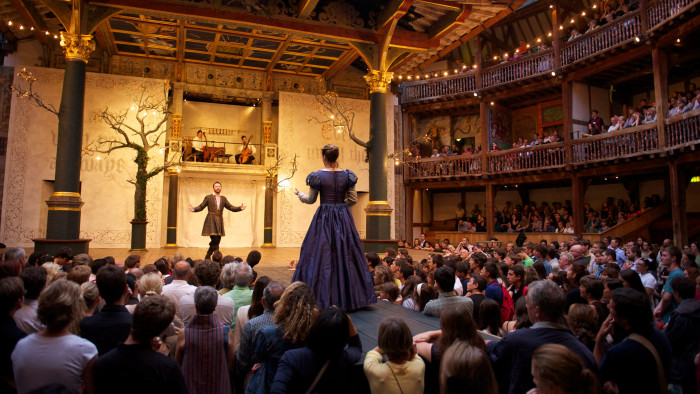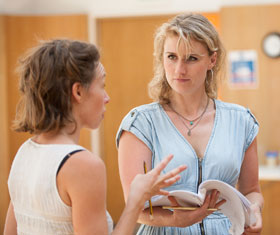Writers’ theatre

Roula Khalaf, Editor of the FT, selects her favourite stories in this weekly newsletter.
Which would you say was the greatest writers’ theatre of all time? For Dominic Dromgoole, it was the Globe – the original 16th-century London theatre, that is, not the modern reconstruction of which he is artistic director. London’s Royal Court, he admits, has a pretty good record, and one could argue that the Moscow Art Theatre and Dublin’s Abbey Theatre are among many other contenders for the title. But, proposes Dromgoole, the original Globe can boast “Jonson, Beaumont and Fletcher, Marston, Middleton, Shakespeare”.
“The architecture and the way it worked with writing created a body of work that no other theatre has ever created,” he adds. “There’s something electrifying about it.”
We are sitting backstage in Shakespeare’s Globe. Through the wall comes the rumble of the opening storm in The Tempest and the faint murmur of the crowd. The circular amphitheatre, with its thatched roof, timber galleries and open-air courtyard where spectators stand up close to the stage, has offered a unique playing space since it opened in 1997. For most visitors, the draw of “this wooden O” by the Thames is to see Shakespeare in near-original conditions. But Dromgoole hopes to remind everyone that those classic pieces were once fresh from the quill – and to coax today’s writers to follow suit.
“People think of Shakespeare as a demigod or a literary icon or a big philosophical problem,” he says, “and they forget that he was a sweaty, nervous, greedy, worried writer. I want to remind people that 400 years ago Shakespeare was wandering around outside, worrying about whether people liked his product or not. And the best way of doing that is to put writers in the same position, taking the same risks.”
Dromgoole argues that the unique properties of the auditorium prompt a style of writing rarely seen elsewhere. Playwrights can’t rely on many of the conventions we take for granted in modern theatre. The vast thrust stage permits no curtains, blackouts or wings, so complex set changes are impossible. You have no spotlights, microphones or wizard technology. Plays start in daylight, the acoustics are challenging, and passing aircraft and thunderstorms can upstage the action.
Half the audience, standing in the yard, can simply wander off: bore them at your peril. But catch them and you’ll be repaid with a festival atmosphere of rare warmth and engagement. Characters can talk to, and even touch, the audience if they choose. It’s a space that rewards audacity, says Dromgoole.

“It encourages you to be public, to be large, to be charismatic,” he says. “You need a bit of flavour in the writing, a bit of boldness. Star parts. And mess. If you try to write tidy, it doesn’t work: breadth and imaginative wilfulness is important.”
Dromgoole has made new plays a significant regular feature at the Globe. This summer sees three new works: Gabriel, a highly original piece by Samuel Adamson exploring the virtuosity of the baroque trumpet; Blue Stockings by Jessica Swale, examining Victorian female university students’ fight for equality; and The Lightning Child, Ché Walker’s spin on The Bacchae by Euripides.
Adamson confirms that the space made him “use some muscles” he’d never used before. He relished the chance to have actors talk directly to the audience. “It’s made me think in a completely different way,” he says. “The kind of sweeping boldness of style that the writing needs here is not something I’ve done before. I did feel freed by it …It’s to do with the directness of the storytelling. The joys and narrative possibilities of direct address – quite an unfashionable thing, particularly in new writing – are really exciting in this space.”
Gabriel opens with direct address: an actor simply steps forward and tells the audience, “When I carry a trumpet, I’m John.” Adamson was inspired by the famous prologue to Shakespeare’s Henry V, which asks the audience to collaborate: “a very open welcoming of the audience into the imaginative world of the play.”
Close-focus domestic dramas are unlikely to fare well here: you need epic themes, lots of characters, action and meaty debate. For contemporary writers, it’s a chance to think big and to try some of the tricks that we know – and love – in Shakespeare: the asides and soliloquies that engage the crowd. The veteran playwright Howard Brenton warmed to this.
“I’ve come to think of the Globe as the experimental theatre,” Brenton says. “It has had an enormous impact on my writing. But then I really felt at home here. I’ve always been interested in a kind of roughed-up epic theatre.”
Brenton seems to have cracked the space. His superb second play made specially for the theatre, Anne Boleyn (2010), married intellectual debate, big characters and rollicking fun and was so successful that it returned for a second run. He’s now working on his third.
“It’s a storytelling theatre,” he says. And it’s very easy to tell stories – you can make jumps in time. You just go round a pillar and say, ‘Five years later,’ and the audience say, ‘OK.’ It’s to do with the fact that there is no set really – basically the theatre is an enormous presence in its own right, and you play over its contours. And that oddly gives you the liberty to do anything. You can switch from serious scenes to knockabout in the twinkle of an eye.”
However, he adds that writing for the Globe is testing: “It does put the fear of God into you. When people’s attention goes in the Globe, it’s really horrible. People leave – and you see them leave.”
Ché Walker wrote The Frontline (2008), the first new Globe play to grapple with a contemporary, rather than a historical, subject (it was set outside a London Tube station). For him, the Globe’s history was daunting, but he balanced boisterous action with vivid language to great effect. Not all new works have prospered. In 2007, Eric Schlosser’s We the People received a critical mauling. Although that play had a momentous subject – the drafting of the American Constitution – it fatally lacked action. Scenes that might have worked in an intimate indoor space came over as static.
Other plays have overdone the boisterous comedy, and Brenton warns that dramatists need to be wary of such pitfalls. Although Shakespeare was no stranger to broad comedy, he points out, such scenes always had purpose. “There is a default setting at the Globe, which is vaudeville. You mustn’t dip down into that too much. You can have a terrific five minutes of vaudeville and then a sudden feeling of silliness comes over everything and concentration disintegrates among that huge crowd.”
Given the fact that the place seems to respond to a bit of swashbuckling, Jessica Swale was surprised when Dromgoole proposed staging Blue Stockings, set in 1896. The Victorian era, she points out, doesn’t fit the Globe so well: “There’s something very refined and held back about it.”
But while her drama will involve less rough and tumble than some, she suggests that the spirited determination of the female students matches the theatre. She observes that the Globe suits political argument because the open air, daylight and spirit of inclusivity give it the feel of a public forum.
“It’s a brilliant place to tackle contemporary issues because it’s a very public, generous space,” she says. “You can see all the audience: it allows everyone to have a voice.”
The challenge for modern playwrights, then, is not to ape Shakespeare and Jonson, but to match their scope, flair and vitality: to find a contemporary voice for this tricky, rewarding space.
But first they have to handle the weather. Brenton admits that, working for the Globe, he became neurotic about rain. “In Anne Boleyn I even wrote one scene which had a good weather line and a foul weather line to cover all possibilities,” he says, laughing.
‘Season of Plenty’, Shakespeare’s Globe, London until October 13 www.shakespearesglobe.com
Comments